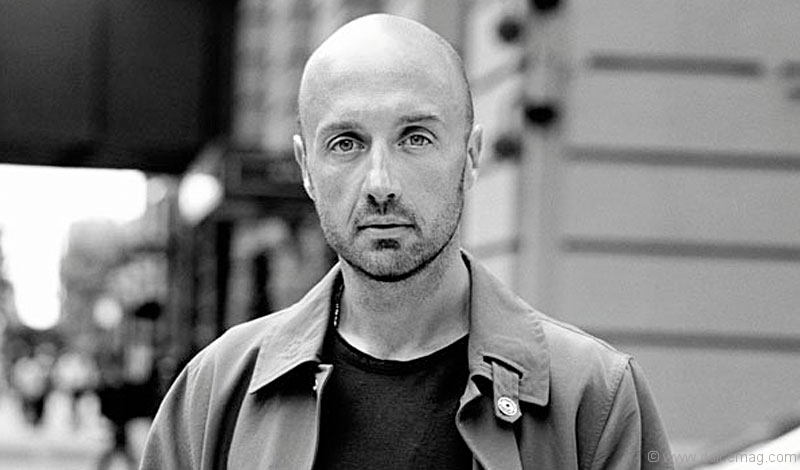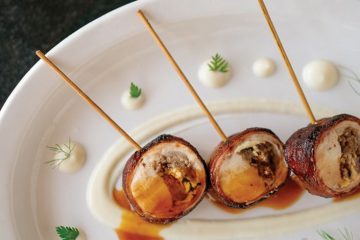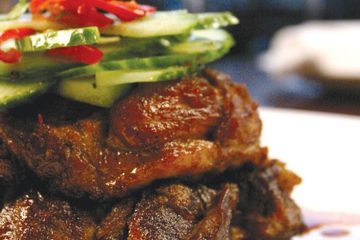Joe Bastianich: The Epicure
It began in 1989, a year when spending sprees and an emphasis on brand names captured the zeitgeist of the era. A freshly minted Boston College graduate thinking that success was to be found in the narthex of corporate margins, Joe Bastianich gravitated to Manhattan like a kid to a lollipop. Wall Street was his Candy Land, his ticket to freedom from a blue-collar destiny. So he began rather impishly, fibbing on his resumé that he was a wine buyer for Felidia (a portmanteau of his parent’s booming New York establishment) and landing an interview at Merrill Lynch because the man who read his application was a regular at the three-star restaurant. He was eventually hired as a bond trader and given a hall pass into a world where the champagne flowed and the Hermès ties and libertine notches on the belt happened to come with the six-figure territory. All rather titillating and grand on the surface, but in his New York Times bestselling tell-all Restaurant Man, Bastianich explains how the debauchery and greed-is-good philosophy imploding around him just wasn’t his particular cup of entrepreneurial tea. Rather, it left him emotionally bankrupt and parching for a life where someone else wasn’t calling the shots on how successful or rich he’d be. A year-and-a-half in and a hefty bonus jingling its way into his bank account, Bastianich jettisoned his job for a one-way plane ticket to a Shangri-La of sustenance. He went to Italy to reconnect to his roots, sipping on vintage wines, dining with vinous companions, tasting the culture that had raised him to understand that one should live to eat rather than eat to live. It was an about-face move that would change the course of his life and legacy. And it made him happier than a bird with a breadcrumb. “It was definitely my soul-searching moment, my professional aha moment,” says Bastianich of the Italian caper that would confirm his inescapable calling. “I knew I had to live my life in wine and food.”
It’s not surprising that the thoroughbred epicure followed in familial footsteps, a decision he labels a “biological imperative” in his book. Mother chef Lidia Bastianich heads an empire of books, cooking shows and restaurants since the opening of Buonavia in the ’70s with his father, the late Felice (Felix) Bastianich. An old-school champion of exceeding patrons’ expectations while drawing his purse strings — the two inherent qualities that make what Bastianich refers to as the “Restaurant Man” in his book — the family patriarch taught Bastianich about service and the fiscal ins and outs of the business; lessons that would take him to the top of the wine and food chain. “Just being solely focused on profit takes the art out of any business, and I think that creativity and passion are what give you success, not the compelling desire for wealth,” says Bastianich, who upon returning from his Italian sojourn partnered with Lidia to open Becco restaurant in 1993. He was 22. A year later, at a James Beard Foundation Journalism Awards dinner she helped organize, Lidia introduced her son to the colourful Mario Batali, who was at the time beginning to pioneer the Italian culinary scene in New York City. “I thought he was a well-organized guy who understood Italian food,” writes Batali in block letters via email, his choice of letter case a fitting conduit for his larger-than-life personality. The seemingly opposite twosome would go on to become an unstoppable force, dispensing the spirit of Italian fine dining across New York with restaurants that include the legendary Babbo Ristorante e Enoteca, Lupa Osteria Romana and the much-celebrated Del Posto. Expanding their empire (the Batali & Bastianich Hospitality Group) to Las Vegas, Los Angeles, Hong Kong and Singapore for a total of 24 restaurants worldwide, the secret to their success lies in the foundations of a friendship: a reciprocity of respect, faith in one another and a common passion. “We both trust each other to have opinions about all of the experience, from food and wine to design and execution of service,” explains Batali. “And [we] are smart enough to back down if the other has a better, more informed, or at least arguable position … It is 80 per cent of both our lives, every day of our lives, and we love it, even the shitty days.”
In 2012, a lawsuit filed against the two business partners most likely brought on the aforementioned state of mind, a period the duo conquered by “staying the path,” explains Batali. According to The New York Times, the case dealt with tip-skimming allegations at several of their restaurants and was settled for $5.25 million. Parties involved were unable to discuss said amount. Of the challenges along the way, Bastianich handles it sunny side up. “We’ve had lots of big bumps, whether it be litigation, various sources, people detractors. But you know, I think that if you keep pure to your commitments and serving great food and creating hospitality, that the customers have the final vote, and they vote with their feet,” says Bastianich. “We’ve been lucky enough to have been able to win that battle most of the time.”
Bastianich, along with Batali, Lidia, Italian businessman Oscar Farinetti and partners Adam and Alex Saper, spawned another hit in 2010: Eataly, an artisanal Italian food and wine emporium in New York City, with a second location in Chicago anticipated in the fall. In an industry that sees more sorry-we’re-closed signs than come-in-we’re-open proclamations, Bastianich is guided by a simple approach to the good road while invoking a dictum of providence. “It’s just a sensibility and respect for hard work and respect for the customers. Luck is when preparation meets opportunity.” And possibly, when one can’t help but be thirsty.
When the chance to pursue his entrepreneurial itch of having vineyards he could call his own presented itself, his exploration of Italian varietals as a 20-something corporate quitter kicked into high gear. Interestingly enough, the experience he gained while washing dishes at his parents’ restaurants proved rewarding. When that Wall Street bond trader called him out on his purported role at Felidia, Bastianich, dancing on a pin, tipped the scales in his favour when he was able to distinguish the differences among vintages of Aldo Conterno Barolos. The modern-day Dionysus now has his own name etched on wine bottles as a co-owner of vineyards in Friuli Venezia-Giulia, Tuscany and Piedmont, and a co-creator of Tritono wine in Argentina. Apart from realizing his grape expectations, Bastianich’s segue into wine has played an integral part in what is now considered a standard element in the high-end restaurant scene. “I think we very much in the last 20 years have been fundamentally integrating wine into the dining experience,” says Bastianich, 44, adeptly applying his hunger for improvement to his own life. The husband and father of three, who quit smoking upon becoming a family man (and also to clear his sensorial palate), is an avid triathlete and guitar-playing enthusiast, who equates the good life to drinking and eating with family and friends.
A foremost restaurateur, vineyard owner, author and TV personality on the fiercely competitive MasterChef with fellow chef-judges Graham Elliot and Gordon Ramsay, Bastianich is also the one man that’s just about as petrifying as the latter. Where the British hothead is expected (and gladly so) to slam cooktops and berate fledging chefs with his fiery “bloody hell’s!” and “you have got to be kidding me’s,” Bastianich infuses a polarizing presence. Calmly and collectively — justifiably so, the man does know what he’s talking about — the erudite word whiz cuts to the core of trembling competitors, all while maintaining icy composure in his tailored suits. “This is a cacophony of dissonant flavours that makes absolutely no sense,” he deadpans to a frontrunner. Her heart lands splat on the stage floor. Moving his subzero eyes onto yet another disastrous dish, he flatly stares down the proverbial underdog of Season 3. “Poorly executed. Not thoughtful. Over elaborate.” Bastianich also joins Carlo Cracco and Bruno Barbieri as a judge on Sky’s MasterChef Italia. A forthcoming show, Hungry, which will piggyback his Restaurant Man memoir, is set to debut sometime this year. “I cook like a badass, but there were too many chefs around me when I was growing up,” says Bastianich. “My mother and Mario, they say too many chefs spoil the soup. So I had to find something else to do.”
Photo by Cass Bird




















































































No Comment